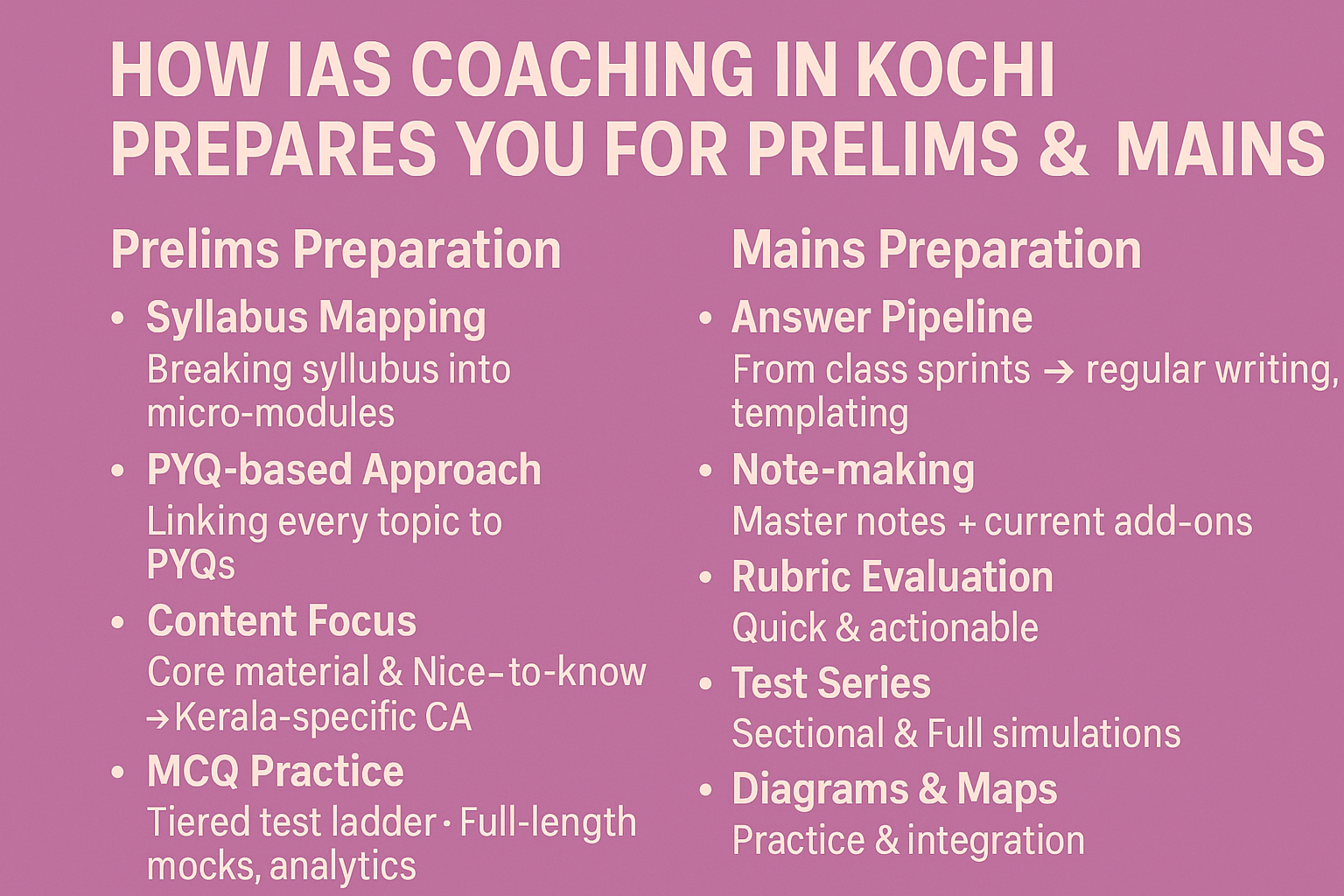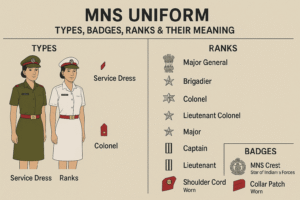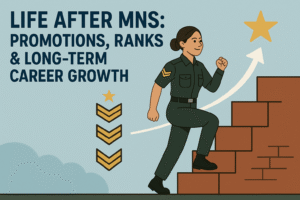Kochi has evolved into a strong UPSC hub with hybrid teaching, experienced mentors, and Kerala-aware current affairs. Here’s a crisp, practical guide to how top IAS coaching in Kochi systematically prepares you for Prelims and Mains, plus a no-nonsense FAQ at the end.
The Kochi Advantage
Faculty depth across Polity, Economy, History, Geography, Environment, Sci-Tech, Ethics, Essay & popular Optionals.
Hybrid access: classroom immersion + recordings and an LMS.
City logistics: metro/bus connectivity (Kadavanthra, Kaloor, Vyttila, Edappally), libraries and PGs.
Prelims Preparation: What Strong Kochi Programs Do
1) Syllabus-first mapping
GS-I blueprint broken into micro-modules (e.g., Polity → Constitution → Federalism → Local Bodies).
Integrated CSAT track from Week-1 (Quant, Reasoning, RC) to avoid last-minute shocks.
2) PYQ-anchored teaching
Every topic is tied to 10–12 years of PYQs, showing patterns, traps, and eliminators.
Reverse engineering practice: convert PYQs into mini-notes + flashcards.
3) Smart content curation
Core notes (must-memorise) + Nice-to-know (context) clearly separated.
Weekly Kerala-linked CA briefs (eco-sensitive zones, fisheries, port projects, coastal regulation, etc.).
4) Test ecosystem that simulates the real exam
Tiered MCQ schedule: Chapter (20–30 Qs) → Section (50–70 Qs) → Full Mock (100 Qs).
Negative marking discipline: calibrated guessing drills and “stop-loss” rules.
Analytics: accuracy vs attempt rate, silly-mistake tracker, topic heatmaps.
5) CSAT mastery without overkill
Skill ladders (Arithmetic → Algebra → DI; RC drills with 400–600 words).
Timed sets (20/40/60 minutes) to build pacing; calculator-free mental math routines.
Mains Preparation: How Kochi Institutes Build Answer-Writing Power
1) Concept → Outline → Answer pipeline
Each class ends with a 10–12 minute answer sprint (150/250 words).
Outline library: intro-body-way-forward templates for 250+ GS topics.
2) Structured Note-making
Two-layer notes: A4 master notes (static syllabus) + current add-ons (schemes, data, judgments).
One-pagers for Ethics caselets; Theme sheets for Essay.
3) Evaluation that matters
Rubric-based checks: relevance, structure, sub-heading flow, examples, diagrams, conclusion.
Turnaround ≤ 5 days with actionable marginalia (replace “good” with “insert Kerala case / add data / draw map”).
4) Test Series Architecture
Sectional tests (GS subtopics), Cumulative (two papers back-to-back), Full simulations.
Copy clinics: before/after samples, topper-style rewrites, and time-boxing.
5) Diagram & Map discipline
India map drill for Geography/Environment; flowcharts for Economy/Policy; ethics matrices for Paper-IV.
6) Essay Method
Thesis → 4–6 pillars → counter-view → way forward framework.
Database of hooks (quotes, constitutional values, Keralite social indicators, SDGs).
Integrated Prelims–Mains Strategy (12–15 Months)
Months 1–4
GS foundation + CSAT basics + weekly MCQs + 1 answer/day
Start Optional orientation; build notes templates
Months 5–8
Raise MCQs to 40–60/day; sectional Prelims tests
Begin Mains sectional writing (2 answers/day), Ethics & Essay fortnightly
Months 9–10 (Prelims peak)
Daily full-length Prelims mocks (alternate days); revision loops (2–3 cycles)
Light Mains maintenance: 1 answer/day
Post-Prelims to Mains (80–90 days)
Full Mains throttle: alternate-day full-length papers, Paper-wise clinics
Essay every week; Ethics casebook drills
What Good Kochi Coaching Adds Beyond Classes
1:1 Mentorship: fortnightly plan reviews, gap-filling, accountability.
LMS Reliability: searchable recordings, timestamps, downloadable PDFs.
Libraries & Study Halls: 7 a.m.–10 p.m., silent floors, Wi-Fi, power backup.
Interview Readiness: DAF workshops, Kerala governance familiarisation, panel mocks (bureaucrats/subject experts).
Sample Weekly Timetable (works for offline & hybrid)
| Day | GS/Optional | Prelims MCQs | Mains Answer | CSAT/Essay |
|---|---|---|---|---|
| Mon–Fri | 2.5–3 hrs topic | 30–40 | 1 | 30 min CSAT/Essay alt. days |
| Sat | Sectional test + discussion | — | 1–2 | — |
| Sun | Optional 3–4 hrs | 20–30 | 1 | Essay outline (alt. weeks) |
FAQs
Q1. How early should I start answer writing?
Start from Month-1 with 1 short answer/day; scale to 2–3/day before Mains.
Q2. How many Prelims mocks should I take?
Target 30–40 quality tests: chapter → sectional → 12–15 full mocks.
Q3. How do I balance CSAT with GS?
Do 30 minutes daily + weekly timed sets; raise intensity in the last 8–10 weeks.
Q4. What’s a good Mains evaluation turnaround?
Within 5 days with specific comments (examples to add, structure fix, diagram prompts).
Q5. Can working professionals crack it from Kochi?
Yes—choose hybrid, use recordings, keep weekly tests, and guard 15–18 focused hours/week.
Q6. When to start Optional?
Month 3–4 after settling GS; sync with PYQs; write 1 answer per sitting.
Q7. How many hours per day should I study?
Quality beats quantity; 4–6 focused hours for students, 2.5–3.5 hours for working pros (plus weekends).
Q8. Any Kerala-specific value adds?
Yes—use state case studies (health, literacy, decentralisation, fisheries, coastal resilience) in Mains & Essay.






